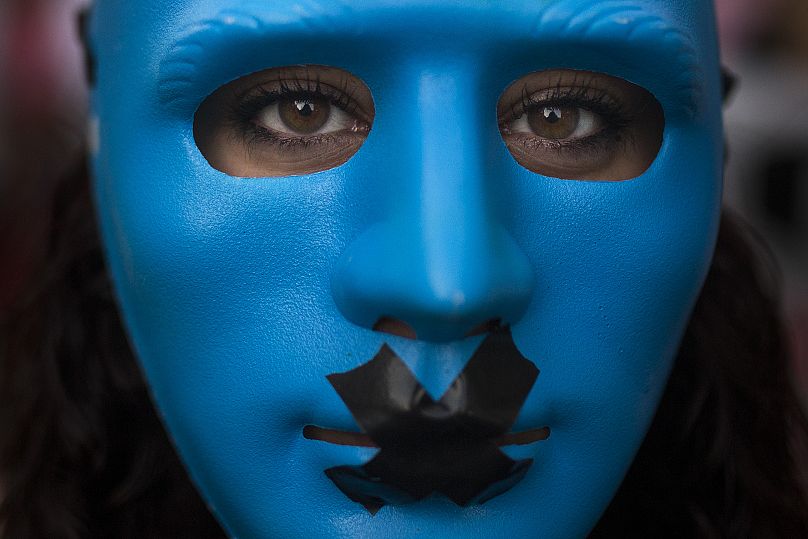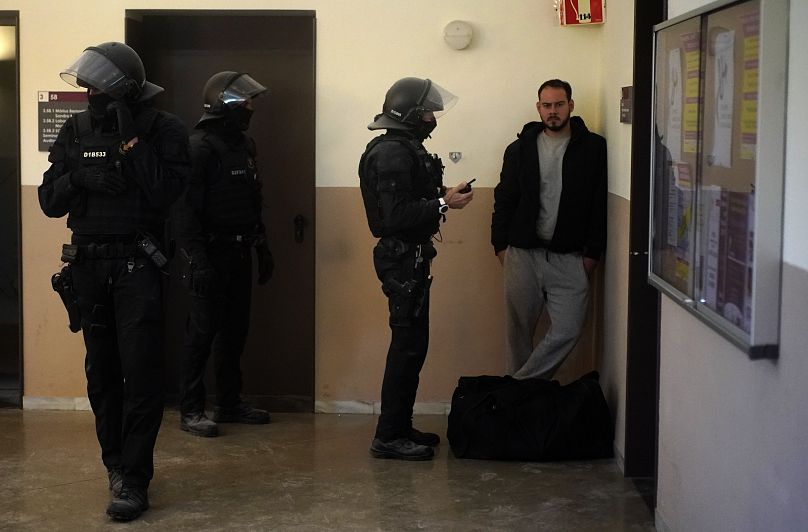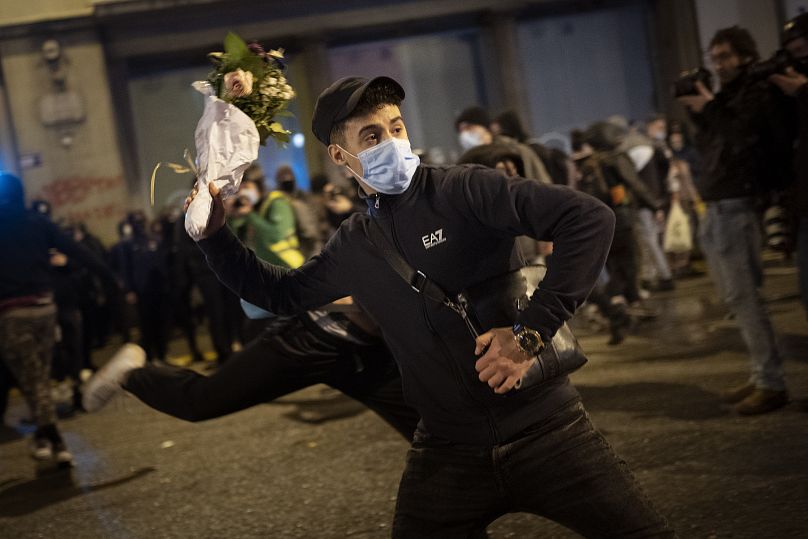The "gag law" has been described as the greatest blow to civil and political liberties since Spain's return to democracy. But do proposed reforms go far enough?
The days of Spain’s highly controversial "gag law" are numbered.
 ADVERTISEMENT
ADVERTISEMENT
 ADVERTISEMENT
ADVERTISEMENT
It has been used to jail rapper Pablo Hasél -- for insulting the monarchy and praising terrorism -- and permit the summary return of thousands of illegal immigrants.
The UN and the European Court of Human Rights say it encroaches on fundamental human rights.
Ione Belarra, the leader of Spain's Podemos party, called it "the greatest blow to civil and political liberties” since the country’s return to democracy.
Now the socialist-led government in Madrid wants to reform legislation brought in by their conservative predecessors seven years ago.
But the proposed reforms have galvanised protest on both sides of the divide, pitting police associations against human rights collectives, and the right against the left, further polarising the country.
Here’s what you need to know.
What is the 'gag law'?
Spain’s 2015 public safety law was dubbed the "gag law" for its crackdown on freedom of speech and the extensive powers it gave to police at a time when the conservative Popular Party were wrestling with social unrest in the shape of anti-austerity protests.
It became illegal to take and distribute images of police officers engaged in law enforcement while spontaneous protests and demonstrations in the vicinity of congress or a government building were fined up to €600,000.
A lack of respect or a show of disobedience towards the police became the most penalised offence in Spain, with one million fines (70% of the total) issued on these grounds last year.
“Disobedience and a lack of respect are the most exploited offences by the police because they are completely ambiguous and allow for a great deal of flexibility,” spokeswoman and lawyer for the human rights platform No Somos un Delito, Sara López Martín, tells Euronews.
When asked if these articles of law were open to abuse, the spokesman for the Justice for the Civil Guard police association JUCIL, Augustín Leal, is adamant.
“No, hombre, no!” he tells Euronews. “To be interpreted as a lack of respect, you would have to call me a son of a bitch.”
However, citizens have been deemed to lack respect for a range of perceived misdemeanours from smirking at a police officer to calling them "mate" to engaging in polite disagreement.
“It’s not even about being insulting,” counters López. “Any disagreement with a police officer can be interpreted as a lack of respect. Disagreements are costly in this country.”
What 'gag law' reforms are on the table?
If the current proposals become law, spontaneous demonstrations will be permissible as long as they have public relevance, and demonstrations in front of Congress and government buildings will be allowed.
Images can be taken and distributed as long as they do not put members of the security forces at risk.
Police officers who pick someone up for identification must return them to the original spot in the space of two hours as opposed to six. And fines will be proportional to income.
There are 300 proposed amendments to the law, 90% of which have been endorsed, though the police, the conservative Popular Party and the extreme right party, Vox, are fiercely opposed to the reforms.
“Nobody has consulted us about these reforms,” says Leal. “And we are the ones on the front line – the professionals.
"The law works as it stands. The public isn’t asking for change.
"Who’s asking for it? The separatist parties. Bildu, the party of ETA terrorists. The reforms bring these parties one step closer to destroying the rule of law.”
Why aren’t the reforms enough for some activists?
No Somos Delito, an umbrella platform for 100 different collectives lobbying for the abolition of the "gag law", points out that the proposals have still not tackled key issues.
The arbitrariness of the concepts "a lack of respect" and "disobedience" has not yet been addressed. Nor has the presumption of credibility, giving the police’s word more weight than a civilian’s.
“According to the proposed reforms, the police could tell a journalist they can’t take photos. The journalist might insist they can at which point the police can fine them for disobedience,” Carlos Escaño, spokesman for Amnesty International tells Euronews. “And who’s to say if a spontaneous demonstration is in the public interest or not? The police. What we are demanding is a mechanism to control police abuses, which right now does not exist.”
Rubber bullets have been banned in Catalonia since a woman lost an eye in 2014 at a protest in support of rapper Pablo Hasél, but the use of such riot gear is still to be addressed on a national level.
One of the most controversial articles of the "gag law" – the summary return of illegal immigrants – is being kicked down the road to be tackled as part of the immigration law.
“What the government is doing in this case,” says López, “is avoiding the matter for fear of the response from the extreme right.”
López maintains the 150,000-strong protests staged in November by members of the security forces were centred around the proposed demand that their actions be coherent, logical and reasonable, which “is pretty revealing about the current mentality of the police”.
What’s curbing the government’s ambition?
“It probably has to do with the rise of Vox and the ultra-right in Spain,” says López. “That’s what the government are telling us – that there are reforms they can’t undertake because the extreme right has a lot of public support and they are also under pressure from police unions.”
López adds the response to the rise of the far-right can’t be to limit freedoms.
“If we respond by depriving citizens of their fundamental rights, we are entering into their game,” she tells Euronews.
What is the police angle?
“They want to ban the use of rubber bullets when rubber bullets is what we use to defend ourselves from violent demonstrators,” says Leal. “We never use them against peaceful demonstrators.”
Leal adds that spontaneous demonstrations are not acceptable as, to ensure public safety, police need time to prepare.
And he rails against the fact that the police’s word should carry the same weight as that of a delinquent.
“There are separatist parties proposing reforms that would mean a police officer losing his authoritative status in a court of law; that our word would not have probative value before a judge,” he says.
Leal is also incensed that police should be asked to justify detentions or spot checks with coherence, logic and reason.
“That already happens,” he says. “I have to document everything. I can’t just do what I like. I would be sent to jail.”
According to Leal, the law does not need to be reformed and is only under revision because the socialist government relies on the separatist parties to keep it in power.
“It’s about the exchange of public safety for quotas of power,” he says. “This is not for the benefit of the citizen.”
He adds that the proposed reforms will usher in anarchy.
“It’s being made to attack the rule of law,” he claims. “To help squatters and anti-system, violent individuals and collectives. We could end up with communism.”
Swords drawn
According to Leal, the police association JUCIL have drawn up a report “detailing how the amendments are unconstitutional, illegal and undermine individual freedoms” with a view to fighting the proposed reforms in the courts.
Meanwhile, No Somos un Delito has scheduled a nationwide protest on February 13 to push for more ambitious proposals two days ahead of a return to the table to hammer out the proposals at the government's interior commission meeting on 15 February.
MPs are then expected to debate and vote on the reform proposals, although no date had been set at the time of publication.
Every weekday, Uncovering Europe brings you a European story that goes beyond the headlines. Download the Euronews app to get a daily alert for this and other breaking news notifications. It's available on Apple and Android devices.













